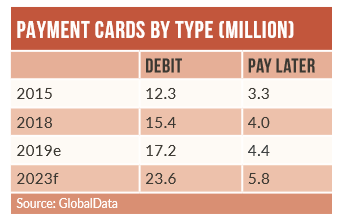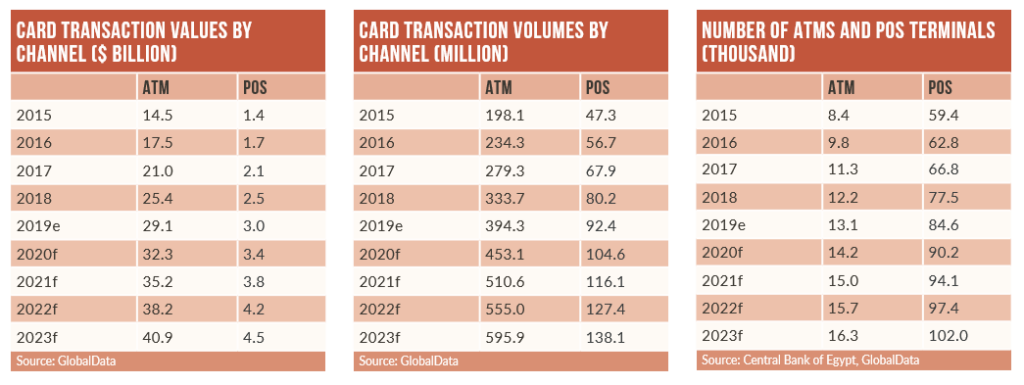Egypt remains a cash-driven society, with consumers preferring to use it for day-to-day transactions. Cash accounted for 77.6% of the overall payment volume in 2019.
Payment card penetration in Egypt stood at 21.8 cards per 100 individuals in 2019, the lowest in comparison to peers including South Africa, Morocco, Kenya and Nigeria. This is due to Egypt’s large unbanked population and lack of financial awareness. As the government works to improve financial inclusion and infrastructure, payment card use is expected to rise over the four-year period of 2019-23.

Access deeper industry intelligence
Experience unmatched clarity with a single platform that combines unique data, AI, and human expertise.
To boost non-cash transactions, the Central Bank of Egypt (CBE) is restricting cash and cheque payments, focusing on mobile payment accounts and introducing new laws to promote electronic payments.
Meanwhile, commercial banks are expanding branch networks and adopting the agent banking model to bring more people into the formal banking system. These efforts resulted in Egypt being one of three countries selected for the Financial Inclusion Global Initiative.
Egypt’s credit card market is still in early stages of development, with low penetration similar to its regional counterparts. This is mainly because Islam forbids interest; other factors include low consumer awareness, high unemployment and stringent credit policies.
While credit card penetration is lower than for debit cards, they are preferred for payments, accounting for 73.5% of the total card payment value in 2019. This is mainly a result of banks promoting use by offering discounts, cashback and instalment facilities.

US Tariffs are shifting - will you react or anticipate?
Don’t let policy changes catch you off guard. Stay proactive with real-time data and expert analysis.
By GlobalDataDebit card penetration stood at 17.3 cards per 100 individuals in 2019, up from 13.8 in 2015. Growth was supported by government initiatives and rising financial
awareness. Financial inclusion is a key government priority, and it has taken steps to bring the large unbanked population into the formal banking system.
As part of Arab Financial Inclusion Day, held between 27 April and 4 May 2017, the CBE directed banks to make efforts to attract unbanked consumers. Activities included presentations of banking products in remote areas, and offering accounts free of charge or for a minimal fee.
E-commerce in Egypt recorded a CAGR of 20.5% over the period 2015-19, driven in part by the government’s National E-commerce Strategy for Egypt launched in 2017. The market has also been boosted by the availability of cards specifically for online shoppers, and alternative solutions such as Masterpass and PayPal. Strong e-commerce growth has prompted several companies to launch online shops in Egypt.
The popularity of prepaid cards is largely due to the high unbanked population. The cards are used for purposes such as payroll, gifting and travel. The number of prepaid cards rose from 7.6 million in 2015 to 13.1 million in 2019 at a CAGR of 14.4%.









